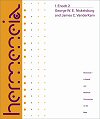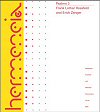Hermeneia Upgrade 2 (2 vols.)
Digital Logos Edition
More Answers from Hermeneia
Unique, authoritative, indispensable, Hermeneia has in a generation produced many of the most influential and informative commentaries on the Bible in the English language. Designed for the serious student of the Bible, each volume in the Hermeneia series aims to lay bare the ancient meaning of a biblical work and utilizes the full range of philological and historical tools. The aim of each volume is to provide a full critical discussion of each problem of interpretation and the primary data upon which the discussion is based. The authors make full use of ancient Semitic and classical languages along with English translations of all comparative materials.
Now, Logos is pleased to offer this upgrade collection, which features the two most recent releases! This collection includes the commentary on 1 Enoch 37–82 by George Nickelsburg and James VanderKam, and the new commentary on Psalms 101–150 by Frank Hossfeld, and Erich Zenger. Anchored by a renowned board of editors, the monumental Hermeneia project has, over the last forty years, produced some of the most authoritative and influential commentaries on the Bible in the English-speaking world. These latest volumes are no exception.
As a critical commentary series, Hermeneia includes many discussions of the original language texts, and plenty of references to standard lexicons such as BDAG and reference grammars such as BDF. In the electronic edition, you can double-click a word in its original language to look it up in a lexicon you may own. And specific citations of lexicons, non-canonical texts, and other works in your library are hotspots—just click to open up the cited work to the passage or article cited!
Looking for the entire series? Hermeneia and Continental Commentaries (68 vols.) is available!
Key Features
- Careful text-critical work by the leading scholars in the field
- Use of extra-biblical sources
- Fresh translations of the texts
- Bold and authoritative interpretations
Praise for the Print Edition
Hermeneia must be regarded as the premier biblical commentary series in the English-speaking world today. While some other biblical commentary series have suffered from the uneven quality of the contributions, the individual volumes of Hermeneia are notable for their uniformly high caliber. The quality of scholarship throughout is first-rate. The Hermeneia commentaries have set a standard of excellence in biblical interpretation that future series will be hard-pressed to meet.
—The Catholic Biblical Quarterly
Hermeneia is offered to us just at the right moment, just as scholarship has reached a summation of a whole period of critical reflection. These commentaries, for the foreseeable future will be the benchmark and reference point for all future work. The series offers the very best available.
—Walter Brueggemann, William Marcellus McPheeters Professor Emeritus of Old Testament, Columbia Theological Seminary
The Hermeneia commentaries are an excellent series, featuring many notable twentieth-century biblical scholars. Taken together Hermeneia represents some of the best recent biblical scholarship … I have no hesitation in recommending them for students.
—Morna D. Hooker, Lady Margaret's Professor Emeritus of Divinity, University of Cambridge
Hermeneia is the great and successful enterprise to link together European and American exegetical traditions, methods, and insights. It is a must in every theological study in Europe.
—Eckart Otto, Professor Emeritus of Old Testament, University of Munich
Hermeneia has established itself as one of the leading international technical commentary series. The depth and breadth of the various authors' grasp both of historical context and of contemporary literature make the volumes an unsurpassed resource for background, informing critique, insightful exegesis, and often stimulating exposition. Serious students of biblical texts will want to consult Hermeneia and where possible to have the relevant volumes close to hand.
—James D. G. Dunn, Lightfoot Professor Emeritus of Divinity, University of Durham
For the study of both the Old and the New Testament the Hermeneia series has made its mark. The series should be welcomed by all scholars, students, pastors, and educated layfolk who are eager to learn more about the meaning of the Word of God.
—Joseph A. Fitzmyer, Professor Emeritus of Biblical Studies, The Catholic University of America
The Hermeneia commentary series is a distinguished contribution to New Testament scholarship. Some of its earlier volumes represent classic positions that must be taken into account by all other interpreters. The newer volumes enrich the usefulness of the series for serious scholars.
—Luke Timothy Johnson, Robert W. Woodruff Professor of New Testament, Emory University
The Hermeneia series has established itself among the most useful tools available for biblical research, whether by professionals or by laypersons. These commentaries present solid scholarship . . . fresh, even venturesome interpretations . . . the books are a pleasure to use.
—Wayne A. Meeks, Woolsey Professor Emeritus of Biblical Studies, Yale University
Product Details
- Title: Hermeneia Upgrade 2
- Series: Hermeneia
- Publisher: Augsburg Fortress
- Volumes: 2
- Pages: 1,240
Individual Titles

1 Enoch presents interpreters with a complex knot of interrelated puzzles concerning the history of early Judaism, the trajectories of wisdom and apocalyptic traditions, and the role of astronomical observation in cosmological speculation—all tied up with the bewildering history of the book's composition and transmission, in different languages and manuscript traditions, over centuries. Two of the world's preeminent scholars offer masterful judgments on all of these questions out of the erudition gained over long and distinguished careers. The result is a remarkably lucid and accessible commentary that will be the definitive resource on 1 Enoch for decades.
. . . The commentary could only have been produced by a mature scholar who has worked on the materials, taking into account a multiplicity of issues—text, source, and literary-critical—for a long time. This is undoubtedly a landmark study in early Enochic tradition and, indeed, it could be said, in the study of Judaism of the Second Temple period. Nickelsburg has succeeded in commenting with linguistic and historical acumen on one of the most complex collections of documents preserved to us from Jewish antiquity. The breadth of his linguistic skills and his wide knowledge of Jewish, Greek, and Christian tradition lend an exemplary balance to his discussions of passage after passage on almost every page. This is a work the value of which will continue to be discovered in the years ahead. Based on this achievement, scholars and students can only look forward to the appearance of the second volume.
—Loren Stuckenbruck, Richard Dearborn Professor of New Testament Studies, Princeton Theological Seminary
A welcome addition to the Hermeneia commentary series . . . extremely valuable for its careful historical, textual, and literary analysis; its very accurate and readable translation; its attention to both the details and the overall shape of the text; and its constant awareness of the importance of social context. It contains countless new, small contributions to scholarship on Enoch, and it brings together the many important contributions that Nickelsburg and others have made over the past thirty years.
—Patrick Tiller, Assistant Professor of New Testament, Harvard Divinity School
We are dealing here with the life achievement of one of the very few real specialists on 1 Enoch. . . . It is clearly written, systematically structured, up to date, easy to use, and a monument of critical, literary, and historical scholarship, a compliment to the Hermeneia series. It avoids the fashionable use of methodologies but, instead, treats us with an abundance of textual analyses, helpful observations, and a richness of tradition–and religion–historical parallel material that makes the study of Second Temple Judaism so rewarding. It deserves its place on the bookshelves of all academic institutions in the study of religions in antiquity, as it goes far beyond the field of biblical studies. A great work.
—Gerbern Oegema, Professor of Biblical Studies, McGill University
George W. E. Nickelsburg is Emeritus Professor of Religion at the University of Iowa, where he taught for more than three decades. He is the author of seventy articles and several hundred dictionary and encyclopedia entries. Among his many works are Early Judaism and Its Modern Interpreters, Jewish Literature between the Bible and the Mishnah, and Early Judaism: Texts and Documents on Faith and Piety, Revised Edition.
James C. VanderKam is John A. O'Brien Professor of Hebrew Scriptures at the University of Notre Dame. He has edited twelve volumes in the Discoveries in the Judaean Desert series and is a member of the editorial committee for the remaining unpublished Dead Sea scrolls. He is one of the two editors in chief of the Encyclopedia of the Dead Sea Scrolls and author of the prize-winning The Dead Sea Scrolls Today, From Revelation to Canon: Studies in the Hebrew Bible and Second Temple Literature, An Introduction to Early Judaism, The Meaning of the Dead Sea Scrolls, and From Joshua to Caiaphas: High Priests after the Exile. Professor VanderKam is the editor of the Journal of Biblical Literature.

In this "meticulous" commentary, "brilliantly" translated by Linda M. Maloney, Hossfeld and Zenger provide for each psalm a relevant bibliography of scholarship, a fresh translation, text-critical and philological details, and commentary on historical context, theological significance, literary structure, and reception (in Septuagint, Targums, and New Testament), engaging a wide range of scholarship as they proceed. Line drawings help to illustrate the Ancient Near Eastern context.
Without doubt, this commentary should be one of the first choices among commentaries on the Psalms for every scholar involved in research in the field. Its methodology is clear, honest, and logical; the material presented is rich; and the structure is effective so that . . . readers will find their way to whatever psalm and its background they are searching for. The editorial board of Hermeneia is to be thanked for its decision to publish a translation of such a first-class commentary.
—Thomas J. Kraus, private scholar
Hossfeld and Zenger have given us the definitive commentary on the Psalms for this generation. Their attention to exegetical, historical, redactional, and theological dimensions of these texts ensures that the reader will have the most comprehensive access to the Psalms. From careful discussion of textual issues to the New Testament's appropriation of the Psalms, they have provided the kind of deep exploration of the Psalter not available in any other commentary.
—Patrick D. Miller, Professor Emeritus of Old Testament Theology, Princeton Theological Seminary
Frank Lothar Hossfeld is Professor of Old Testament at the University of Bonn, Germany. He is the author of Der Dekalog and Untersuchungen zu Komposition und Theologie des Ezechielbuches. He also is the coauthor of Psalms 2 in the Hermeneia series.
Erich Zenger is Professor of Old Testament at the University of Münster, Germany. He is the author of numerous works, including To Begin with, God Created and A God of Vengeance. He is also the coauthor of Psalms 2 in the Hermeneia series.
Reviews
6 ratings

Boyd Whaley
6/8/2018

Allen Bingham
4/7/2014

Alcides Bardela Filho
3/25/2014
Tom Serrano
12/28/2013

Lee Rupert
9/7/2013
Matthew Candler
2/22/2013
Would have been in a flash if the 3 Volumes on the Psalms were sold as a package.
Ordice Gallups, Obl.S.B.
12/17/2012